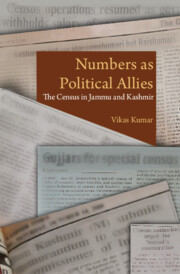2 - Counting amidst Uncertainty
Published online by Cambridge University Press: 25 October 2023
Summary
[T]he second phase went off well till September 4, 2000 when a threat call against conducting of census by a militant organisation, Hizbul Mujahideen, appeared in all the newspapers including national dailies.
—Director of Census Operations, Jammu and Kashmir (GoI 2001b: 16)Introduction
Located in the north-west extreme of India's ethno-geographic periphery, Jammu and Kashmir (J&K) was initially a Category B state. Unlike other princely states belonging to Category B and Category C that were absorbed into larger states or reconstituted as union territories (UTs), J&K was directly granted the status of a separate state. The state had two capitals: Srinagar (summer) and Jammu (winter). Before being reorganised into two UTs on 9 August 2019, the state comprised three administrative divisions: Jammu (26,293 square kilometres), Kashmir (15,948 square kilometres) and Ladakh (59,146 square kilometres). The last was until recently a part of the Kashmir division and was constituted as a separate administrative division in February 2019, less than six months before the reorganisation of the state. The reorganisation marked the end of the seven-decade-old constitutional arrangement under Article 370 that guaranteed autonomy to the state to accommodate the restive Kashmir Valley amidst domestic and international challenges to the Muslim-majority princely state's accession to India (Timeline 2.1). International and domestic conflicts spawned by the unsettled political status have affected the whole range of government statistics in J&K, compounding the challenge posed by difficult weather and terrain.
In this chapter, we will first discuss the less-than-satisfactory accounting of the area of J&K. This will be followed by a discussion of how political instability, uncertain weather, mobile population groups and shifting reference dates affect headcounts and how our ability to understand their impact on the quality of census data is constrained by the paucity of metadata.
Indeterminate Borders
The territory of J&K under the Indian administration has remained largely unchanged after tribal militia backed by the Pakistani army seized parts of the princely state in 1947 and China occupied parts of Leh in the 1950s and early 1960s. The only officially recognised change on the western front happened under the Simla Agreement of 2 July 1972 after the 1971 Indo-Pakistan war that froze the ‘line of control [LoC] resulting from the cease-fire of December 17, 1971’ (GoI n.d.2). Census reports are deficient in information on international territorial changes, though.
- Type
- Chapter
- Information
- Numbers as Political AlliesThe Census in Jammu and Kashmir, pp. 67 - 125Publisher: Cambridge University PressPrint publication year: 2024



